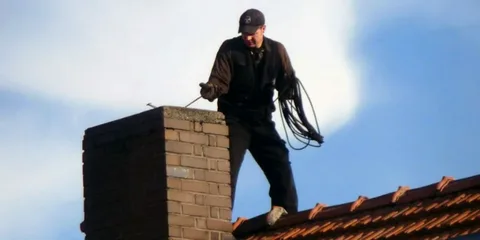Chimneys in Louisville face a unique combination of weather extremes, from humid summers to icy winters. These fluctuations can cause significant wear and tear on chimney systems, making proper protection and maintenance essential. Homeowners and property managers must consider which liner material and design will offer the most resilience and safety across all seasons. Making an informed choice is crucial for cost efficiency, protection, and compliance with local regulations regarding Chimney Liner in Louisville.

Why It Matters
The effectiveness of a chimney liner determines more than just the longevity of your chimney; it directly impacts energy efficiency, air quality, and fire safety. Louisville’s mix of moisture, freeze-thaw cycles, and variable temperatures can rapidly deteriorate unlined or poorly lined chimneys. A properly chosen liner prevents corrosive damage, ensures smooth venting of gases, and helps contain potential chimney fires, reducing overall risk to your property.
Common Problems
Louisville homeowners often encounter chimney issues like masonry cracking, moisture intrusion, and the buildup of harmful creosote. Without a suitable chimney liner, these problems can worsen, causing structural degradation and unsafe indoor air. Additionally, poorly maintained liners may fail to contain carbon monoxide or manage downdrafts, leading to potential health hazards and increased heating costs. Identifying these issues early is key to preventing long-term damage.
Key Benefits
Selecting the right chimney liner offers a range of advantages:
Stainless steel liners are preferred for their durability, corrosion resistance, and adaptability to various fuel sources.
Clay tile liners are traditional but may crack under Louisville’s freeze-thaw cycles.
Cast-in-place liners provide structural reinforcement and excellent insulation.
Each option enhances draft efficiency, reduces maintenance needs, and protects against dangerous gas leaks.
“The best chimney liner is one that balances longevity with the ability to withstand Louisville’s unpredictable seasonal shifts, ensuring homes remain safe and energy-efficient year-round.”
Routine maintenance, including inspections and cleaning services like Gas Fireplace Cleaning, ensures that the chosen liner continues to perform optimally, safeguarding property and occupants alike.
The Role of Dryer Vent Cover Replacement
While chimney liners are central to fireplace safety and efficiency, related systems such as dryer vents must not be overlooked. Dryer vent cover replacement plays a critical role in maintaining proper airflow, preventing lint buildup, and reducing fire hazards. In Louisville’s humid climate, clogged or broken dryer vent covers can lead to moisture problems or even blockages that impact overall indoor air quality. Regularly updating vent covers ensures both your chimney and auxiliary systems work efficiently together, promoting a safer living environment.
Cost Breakdown
Understanding the costs associated with chimney liner installation and maintenance in Louisville is vital for budgeting and planning. Several factors influence pricing, including liner material, chimney height, labor rates, and any necessary repairs to the existing structure.
Disclaimer: Prices are estimates for Louisville, Kentucky as of 2024. Actual costs may vary depending on inspection results, property specifics, and provider rates. Always request a detailed quote before proceeding.
| Chimney Liner Type | Estimated Cost (Installed) |
|---|---|
| Stainless Steel | $1,500 – $3,000 |
| Clay Tile | $2,000 – $4,000 |
| Cast-in-Place | $2,500 – $5,000 |
Key Features
The most effective chimney liners for Louisville conditions share several important features:
High resistance to corrosion
Ability to withstand rapid temperature changes
Compatibility with all fuel types
Insulation properties that minimize condensation
Flexibility (for retrofitting older chimneys) or rigidity (for straight flues)
Verified UL listing or equivalent safety certifications
Safety and Emergency Services
Chimney liner safety extends beyond installation; it relies on ongoing professional inspections and emergency services. Louisville’s seasonal storms, heavy snow, and occasional tornadoes can all impact chimney integrity. Emergency repair providers should offer:
Rapid response for liner cracks, blockages, or gas leaks
Regular safety checks to ensure your liner is obstruction-free, sealed, and code-compliant
Staying proactive with maintenance reduces the likelihood of costly or dangerous emergencies.
FAQs
Q: How often should my chimney liner be inspected in Louisville?
A: Annual inspections are recommended due to the region’s variable weather and potential for creosote buildup.
Q: Which liner material is best for gas-burning appliances?
A: Stainless steel liners are generally preferred for their corrosion resistance and adaptability to gas, wood, or oil.
Q: Is professional installation necessary?
A: Yes, proper sizing, placement, and sealing require expertise to meet safety codes and warranty requirements.
Q: Can a damaged liner be repaired, or does it require replacement?
A: Minor cracks may be repaired, but severe deterioration typically requires full liner replacement to maintain safety and performance.
Conclusion
Choosing the best chimney liner for Louisville weather conditions is a critical investment in property safety, efficiency, and value. Stainless steel and cast-in-place liners generally offer the durability and performance needed to withstand local climate challenges, while ongoing maintenance and related services like dryer vent cover replacement further protect your home. By prioritizing quality, professional installation, and regular inspections, Louisville residents can ensure their chimney systems operate safely and efficiently throughout the year.
READ MORE…. Louisville Chimney Sweep